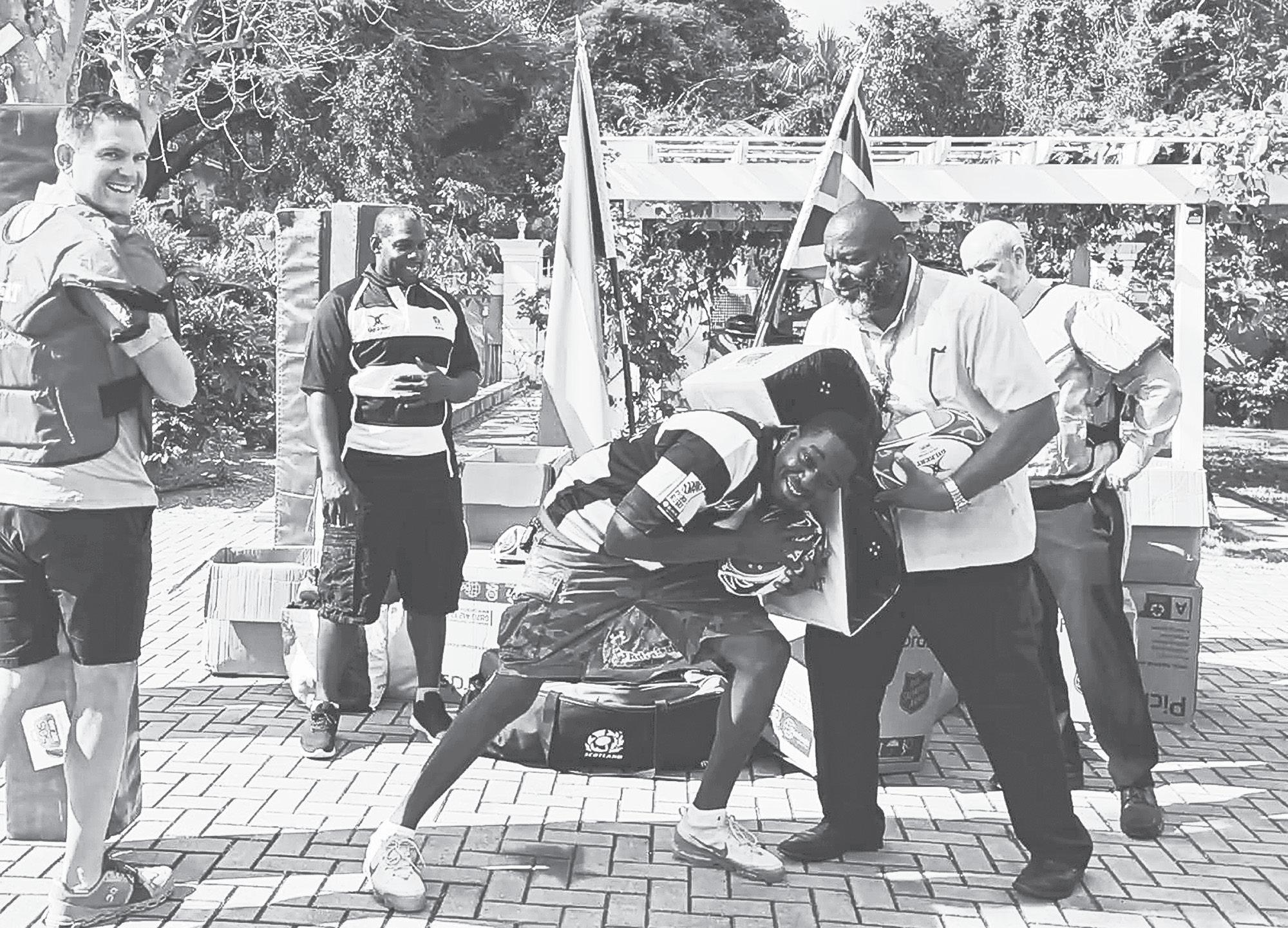woman & health









By KEILE CAMPBELL Tribune Staff Reporter
kcampbell@tribunemedia.net
Health and Wellness
Minister Dr Michael Darville confirmed the decision during his budget communication in the House of Assembly yesterday, signalling the government’s break from an intermediary system that has come
THE Bahamian government will sever ties with Cuba’s medical recruitment agencies and move to hire Cuban healthcare professionals directly, potentially cancelling existing contracts after months of evasion, pressure from the United States, and leaked allegations of exploitation.
By RASHAD ROLLE Tribune News Editor
rrolle@tribunemedia.net
THE Bahamas is set to launch its first-ever kidney transplant programme this week, while simultaneously advancing two hospital projects and finalising the acquisition of a fully equipped private hospital on East Bay Street.
Health and Wellness
Minister Dr Michael Darville confirmed Monday during his budget debate contribution yesterday that Princess Margaret Hospital (PMH) will conduct the country’s first living donor kidney transplant on June 18, supported by specialist surgeons from Trinidad and


Mom still ‘frozen in the moment’ after three sons died in car crash
By JADE RUSSELL Tribune Staff Reporter
LOVAN Christie wishes she could say just one more thing to her sons: “Don’t leave mummy.” It’s been over nine months since a tragic car
crash in New Providence claimed the lives of all three of her sons — Philip McCarron Christie, 24, Philip D’Caprio Christie, 23, and D’Angelo Christie, 20. And while the rest of the world has moved on, she remains frozen in the moment her life shattered.
“I still am broken. Only God could do what no man can do. Right now, I’m riding out my storm,” Mrs Christie said tearfully, her voice trembling as she hummed a gospel hymn. “Day and night I do cry for
By LEANDRA ROLLE Tribune Chief Reporter lrolle@tribunemedia.net
THE Road Traffic Department will open a new office in eastern New Providence before year’s end, Transport and Energy Minister JoBeth Coleby-Davis announced in the House of Assembly yesterday. Citing the island’s growing population, Mrs Coleby-Davis said the new location will serve residents of St Anne’s, Fox Hill, Yamacraw, Elizabeth, and Sea Breeze.
lrolle@tribunemedia.net
MORE than 63,000 households across The Bahamas received monthly electricity bills under $125 between January and May, thanks to the government’s Equity Rate Adjustment (ERA) Initiative, Energy Minister JoBeth ColebyDavis announced during her budget presentation. Introduced in July 2024, the ERA initiative removed the charge for the first 200 kilowatt-hours of electricity used per month.


By EARYEL BOWLEG Tribune Staff Reporter ebowleg@tribunemedia.net
SENIOR Justice Deborah Fraser was officially sworn in yesterday as a permanent Justice of the Court of Appeal during a ceremony at Government House.
Justice Fraser previously served as director of legal affairs in the Office of the Attorney General, Acting Registrar General, and as a Justice of the Supreme Court.
“I’m looking forward now to going on to the Court of Appeal, where basically you would get more in-depth submissions on the law and contribute to the development and the advancement of the law in terms of what gaps there are, what changes can be recommended,” she said.
She expressed gratitude for the support received over her 38-year career in public service and reflected on her responsibilities in litigation, legislative drafting, and civil matters. On the Supreme Court, she served for about five years on the criminal bench before transitioning to the civil bench.
Court of Appeal president Milton Evans welcomed her appointment and praised their longstanding professional relationship.
“It’s a pleasure for me
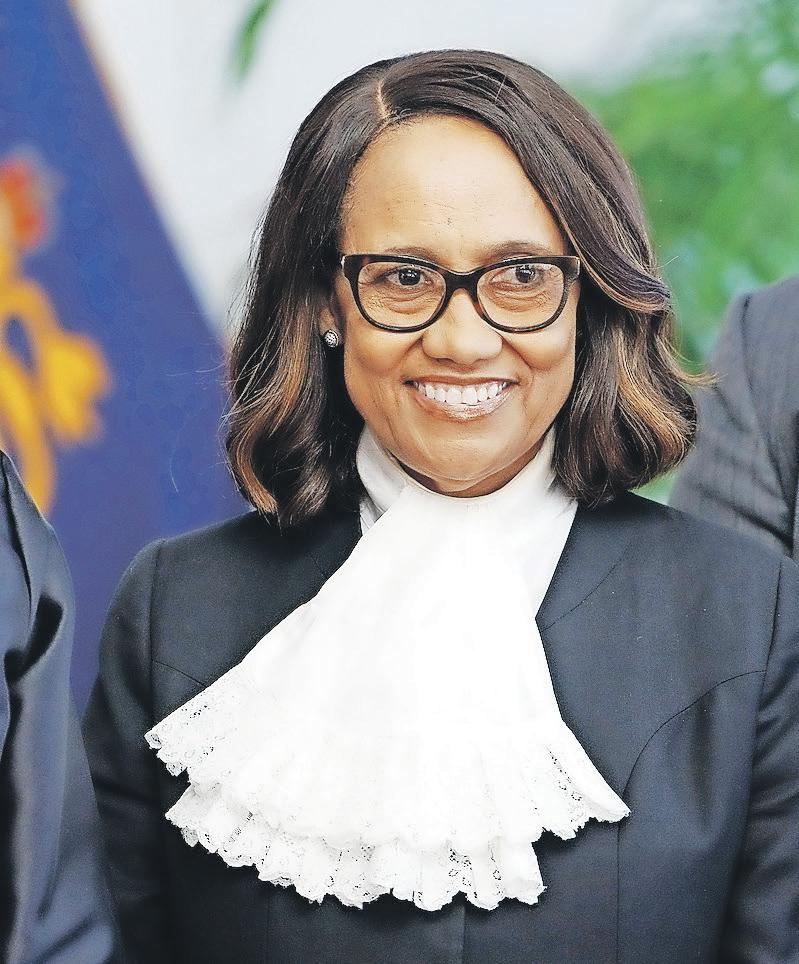
to continue that relationship to someone who has always been diligent, always interested in the law, and basically is a comfortable person to work with,” he said. “I look forward to the time that she will be with us and the contribution that she will make, and I have no doubt that the contribution she makes will be a valuable one.”
Chief Justice Ian Winder called her elevation a significant
achievement, stating the opportunity was “well deserved” and “well earned”.
“We will certainly miss you on the Supreme Court bench because you were a diligent, efficient judge. You never hear a complaint about a judgment from Justice Fraser taking too long to be delivered. So certainly you leave the Supreme Court with a very unblemished record in that regard,” he said.

my children. Every time I look at something belonging to them, my heart breaks.”
This is the first time the 57-year-old mother is speaking publicly since the early morning crash on September 2, 2024, along Sir Milo Butler Highway, a tragedy that sent ripples of grief across the country.
“I wanted to speak for mothers who have lost their strength through tragedy,” she said. “Because this pain, this is not something you ever get over.”
The three Christie brothers had left their quiet life in Andros and relocated to New Providence, chasing bigger dreams. It was Philip D’Caprio who led the way, Mrs Christie explained. He was deeply motivated and, recognising the lack of economic opportunity in Andros, made the move first. Once he got on his feet in New Providence, he encouraged his younger and older brothers to join him, determined to help them find better prospects. She raised her four children — three sons and an eldest daughter — with
her late husband, who died from a heart attack when the kids were still young. After his death, her sons became her anchors, reflections of the man she once loved.
“They weren’t just my children. They were my best friends,” she said. “The greatest gift I ever had is my children.”
The night before the accident, her youngest sent her a photo of his new tattoo: “God is with me,” surrounded by crosses. A day later, they were gone. She remembers the call that changed her life. A woman on the phone said there had been a crash. When Mrs Christie asked if her sons were okay, silence followed. The woman urged her to gather her family.
Soon, a male relative close to her sons arrived in tears. “When he looked at me, the water burst out of his eyes because he always used to be with them,” she said. “I knew right then.”
Despite being described as responsible drivers, the circumstances of the crash remain unclear. Mrs Christie said her son Philip D’Caprio had been driving.

She flew to New Providence to retrieve her sons’ belongings. Initially, a senior officer of the Road Traffic Department was supportive. But when she later asked about D’Caprio’s missing wallet and a sentimental hand chain that once belonged to their father, she said the tone changed.
“He shouted at me, accused me of saying they stole the items,” she said.
“He said a lot of people were at the scene before police arrived. I left in tears. I never got those things back.”
Since that day, life has blurred into survival. “I’m alive, but I’m on autopilot,” she said. “Only the word of God is keeping me going.”
Now, she’s calling for a national Remembrance Day to honour lives lost in sudden tragedies like traffic accidents, drownings, shootings, and plane or boat crashes.
“I may have lost three at one time, but there are many others who’ve lost someone just as dear. Nobody expects a sudden death. And nobody has a Remembrance Day for those people,” she said.

Prosecutor: Video shows murder accused spot the victim at bar before the killing
By PAVEL BAILEY Tribune Staff Reporter pbailey@tribunemedia.net
A PROSECUTOR claimed yesterday that a man accused of a fatal 2021 shooting on Carmichael Road spotted the victim in a bar just hours before the killing, as she made her closing submissions in the Supreme Court.
Jawuan “Fat Boy” Armbrister was present in court as Cephia Pinder-Moss presented final arguments in his murder and attempted murder trial before Justice Guillimina Archer-Minns.
Armbrister, who appeared in a wheelchair, is accused of fatally shooting Devonte Brown while Brown was riding a motorcycle near Meat Max on Carmichael Road sometime between September 17 and 18, 2021. Armbrister is also accused of shooting and injuring Valverde Butler, who was on the same motorcycle.
During her submissions, Mrs Pinder-Moss pointed to surveillance footage from Pro Sports Bar timestamped at 11.47pm on September 17, 2021. She claimed the footage showed Armbrister doing a double take inside
the bar upon seeing the victim, and said the two exchanged words outside the establishment hours before the shooting. Mrs Pinder-Moss told jurors the victim’s mother had attended every day of the trial and said her life had been forever changed by the incident. She said the mother had described her son as “the life of the party”.
She noted that another man, known as “DJ”, had also been charged in the matter but is now deceased.
The prosecutor claimed Armbrister believed he had committed the perfect crime and dismissed the defence’s argument that the evidence was flawed. She also addressed testimony from Derron Rolle, who previously told police he gave Armbrister his car keys on the night of the shooting but later recanted that claim in court, saying he had been coerced by police.
Mrs Pinder-Moss argued Mr Rolle’s original statement was credible because of its detail, including that he had eaten chicken and fries the night Armbrister allegedly visited his home and borrowed the car. She said Mr Rolle changed his story at trial in an effort


his mother picked him up and they returned home. Mr Rolle maintained he always had the car keys in his possession.
to protect a friend.
When Mr Rolle took the stand, he testified he had purchased a black 2010 Honda Fit suspected of being used in the crime. Though the vehicle was registered in his mother’s name, he said he had bought it himself.
Mr Rolle said that on the morning of September 17, 2021, his mother drove him to work in the car. He believed she returned home afterward, though he wasn’t certain if she had work that day.
Around 6pm, he said
After collecting his girlfriend from work that evening, he said they arrived back home shortly after 8pm and parked the car outside his aunt’s house. Around 9pm, he said he got food from his aunt’s restaurant and later watched a movie with his girlfriend before going to bed around 11pm.
He insisted no one visited that night and the car was in the same spot when he left for work at 7am the next day.
Mr Rolle said the inconsistencies between his court testimony and police statement were due to threats he received from
officers at the Central Detective Unit, although he could not name them. He said he was arrested several weeks after the incident during a traffic stop with his mother in the same vehicle.
However, the prosecution countered that neither Mr Rolle nor his mother were arrested, and Mr Rolle responded that he had voluntarily turned himself in. Mr Rolle acknowledged knowing Armbrister from school but denied they were friends. He also said Armbrister was not in a wheelchair in 2021. He denied the prosecution’s claim that Armbrister came to his house around 8.30pm on September 17 and borrowed the car, as stated
in the police report. He said police fabricated that detail.
The prosecution pointed to the police statement noting Mr Rolle had bought chicken and fries from a restaurant and that Armbrister returned the car keys by knocking on his window at 5am. Mr Rolle denied this, saying he always woke up at 5am—two hours before work—and did not recall Armbrister returning the keys at that time.
The defence has maintained Armbrister’s innocence. He is represented by Miranda Adderley.
Danielle Capron also served on the prosecution team alongside Mrs Pinder-Moss.


By EARYEL BOWLEG Tribune Staff Reporter ebowleg@tribunemedia.net
THE Bahamas Aviation, Climate and Severe Weather Network (BACSWN), in collaboration with the Department of Meteorology, has begun calibrating, maintaining, and upgrading the country’s existing radar network to enhance public weather forecasting ahead of the 2025 hurricane season.
Minister of Transport and Energy Jobeth Coleby-Davis announced the initiative in the House of Assembly yesterday, citing the government’s Heads of Agreement with BACSWN signed in May.
The partnership represents an investment of more than $400m over three years.
The agreement will establish the first NextGEN Meteorological Watch Office in the Caribbean, along with a comprehensive tracking network for weather, aviation, terrain, hydrology, and mapping.
“The Watch Office, coupled with BACSWN’s ‘first-of-its-kind’

atmospheric, aviation, climate, surface hydrology, 3d terrain, street and chart mapping and severe weather tracking network, will bring about live flight tracking, crash search and rescue coordination and advanced real-time reporting of meteorological conditions affecting the entire Bahamas,” said Mrs Coleby-Davis. She described the partnership as a landmark development for The Bahamas, significantly
enhancing the aviation sector, which is crucial to the country’s tourism-based economy.
“By partnering with BACSWN – a Bahamian company with strong global relationships – we not only believe the timeliness and accuracy of The Bahamas Department of Meteorology forecasts will be significantly enhanced; but that various other sectors of the country will also benefit,” she said.
The agreement also
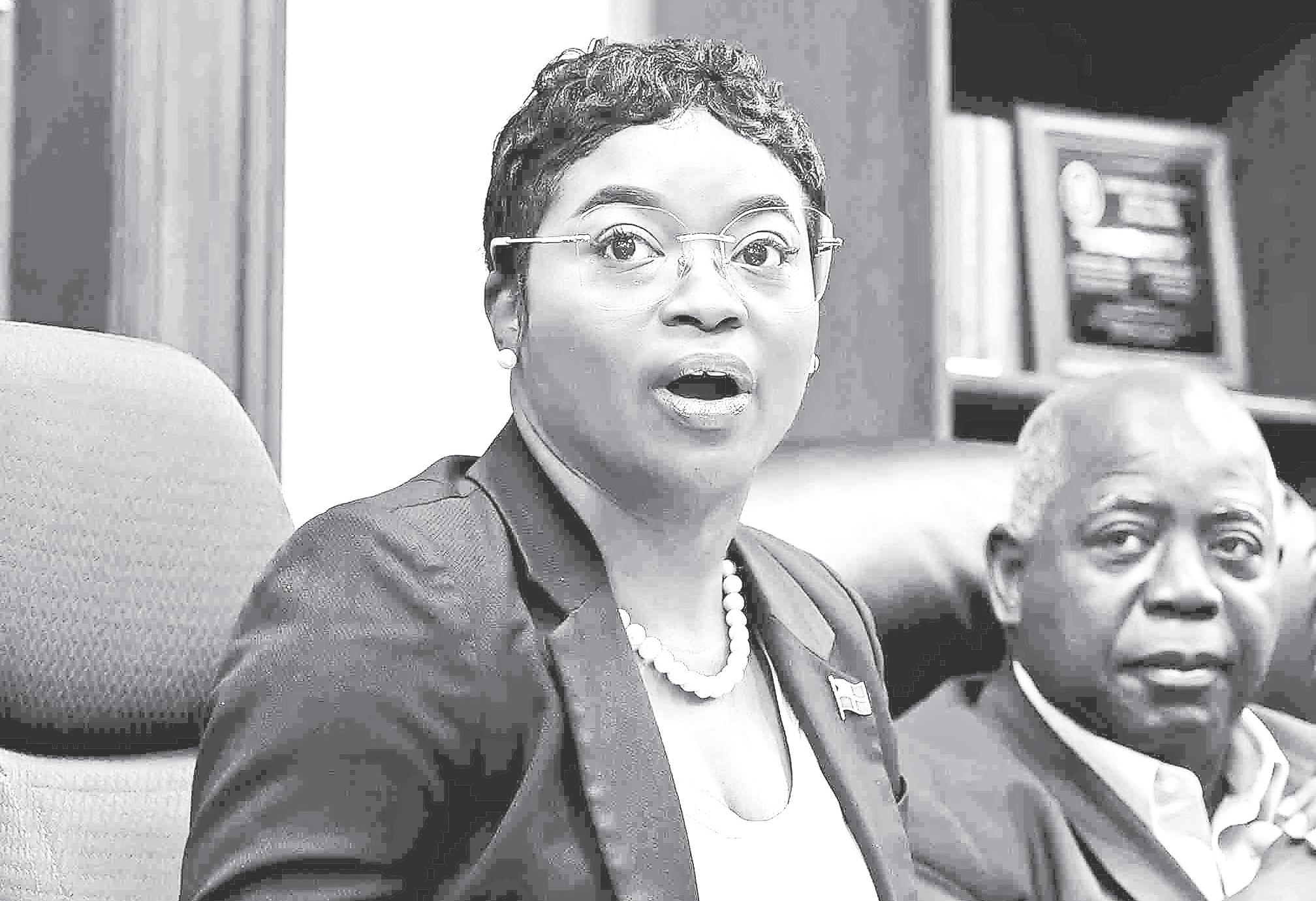
Additionally, new department offices are planned for Great Harbour Cay, Inagua, Acklins, and Crooked Island during the current budget cycle. On the topic of road safety, the minister detailed several outreach initiatives. These include the installation of safety billboards across New Providence and the Family Islands and partnerships with Bahamian personalities to produce video messages on safe driving practices. Outreach efforts have also expanded into schools.
“In partnership with RM Bailey High School, we created a road safety music jingle which will play on TV and radio stations,” she said. The ministry is also launching a Future Safe Driver Education Programme in collaboration with the Ministry of Finance, Ministry of Education and Technical and Vocational Training, the Road Traffic Department, and the Royal Bahamas Police Force. Aimed at students aged 15 to 17, the programme uses simulators to teach safe driving techniques tailored to Bahamian road conditions.
“It is important to note that the Future Safe Driver Education Programme will not negatively impact lessons offered by driving schools as the programme will be fully simulator based,” she clarified, adding that the Bahamas Driving School Association will be involved as the programme develops.
So far this year, 35 traffic fatalities have been recorded, primarily in New Providence and Eleuthera. Speeding remains a leading factor, the minister noted, urging motorists to follow speed limits and wear seatbelts.
includes training opportunities for Bahamians, including at least ten scholarships and job placements in meteorology, broadcasting, aviation law, on-air hosting, and mobile production. BACSWN will support the development of technical courses at the University of The Bahamas, the Bahamas Technical and Vocational Institute, and the Bahamas Baptist Community College.
Prime Minister Philip

“Brave” Davis previously described the partnership as a key step in “strengthening our national resilience” through the NextGEN meteorological watch office.
Michael Strachan, BACSWN’s group financial advisor, revealed that the company will submit a proposal to the International Civil Aviation Organization (ICAO) to increase overflight fees to $775 per flight, of which $550 would go to the Bahamian government.
“In coordination with the Department of Meteorology, we’ll be installing, upgrading, and maintaining current equipment,” Mr Strachan said. “Based on that, we will be going to ICAO with a proposal for a fee restructure regarding the overflight fees.”
He noted the proposed changes could yield the government over $300m annually, with approximately 600,000 flights passing through Bahamian airspace each year.
Previously priced at 10.95 cents per kilowatt-hour, the removal now saves consumers roughly $21.90 monthly. Mrs Coleby-Davis said the initiative is having a measurable impact. In January, 58,933 households received bills below $125. That figure rose to 63,058 in February, 64,053 in March, and peaked at 67,693 in April before dipping slightly to 62,209 in May.
“Now we are aware that energy consumption is traditionally less during the winter months and there are other variables to consider such as the fuel charge, however, the ERA is having an impact,” she told Parliament. She also highlighted the success of the government’s “Merry and Bright Turn on Your Light” programme, which aims to reconnect more than 4,000 households that had been without electricity. From November through January, customers were allowed to restore service by paying as little as ten percent of their outstanding balances, with flexible repayment terms offered for the remaining amount.
BGC, which is leading the overhaul of New Providence’s electricity grid, has already made progress in replacing overhead distribution poles, reconducting wiring, and improving system reliability with the installation of IntelliRupters. The company has also completed extensive emergency repair work, expanded underground services, and reinforced the transmission network with additional steel poles, fiber, and new conductors. Despite BGC managing the grid upgrades, Bahamas Power and Light (BPL) remains responsible for customer service, billing, and third-party power generation contracts.
As part of its transition to cleaner energy, BPL has signed power purchase agreements for 177 megawatts of liquefied natural gas (LNG), 60 megawatts of solar power, and 10 megawatt-hours of battery storage for New Providence. While BPL will continue to generate power using existing infrastructure, the new agreements include the introduction of more efficient engines. Mrs Coleby-Davis said the goal is to have half of
In addressing long-term energy infrastructure, Mrs Coleby-Davis confirmed that the Bahamas Grid Company (BGC) began installing the first set of new transmission poles this week, with completion expected within 12 months.
New Providence’s energy come from LNG by the fourth quarter of this year. Two of the three solar and battery storage projects are slated to be operational by the second half of 2026, with the final project expected in early 2027.
She added that similar renewable energy projects are underway in the Family Islands, with battery storage initiatives planned or in progress for Abaco, Eleuthera, Great Exuma, Andros, Cat Island, San Salvador, Long Island, Bimini, Staniel Cay, Moore’s Island, and others.
“The PPAs that have been signed—or are nearing execution—include utility scale solar projects expected to be completed during the second half of 2026,” she said. “These projects, delivered under the New Energy Era, will play a critical role in accelerating The Bahamas’ transition to renewable energy. Building on our current seven percent renewable contribution, the completion of these projects is projected to bring us to approximately 33 percent, surpassing the national target of 30 percent by 2030.”
She said the government’s energy plan not only signals a strong commitment to sustainability, but also supports an inclusive approach to long-term energy reform.
from page one
under attack by the Trump administration.
“We are prepared to cancel existing contractual agreements and enter into direct employment contracts with Cuban healthcare professionals currently in The Bahamas,” he said. “Those who agree to these new contractual terms will sign the new employment agreements directly with my ministry and remain in the country.”
Those who decline, he added, “will be given time to wrap up their affairs and return to Cuba”.
The move follows months of government resistance to fully disclose or acknowledge how much of the doctors’ compensation is retained by the employees.
A leaked 2022 contract published by Cuba Archive indicated The Bahamas paid up to $12,000 per month per doctor, while the Cuban professionals received only $990 to $1,200, the rest going to Cuba’s state-run agency, Comercializadora de Servicios Médicos Cubanos (CSMC).
While Prime Minister Philip “Brave” Davis and Foreign Affairs Minister
Fred Mitchell had publicly downplayed or dismissed concerns over the wage arrangement, neither had categorically denied the central claims. Mr Davis had previously indicated that US officials were “satisfied” with The Bahamas’ handling of the issue after meetings in Washington but stopped short of committing to reforms that would guarantee a larger share of wages for the doctors.
“It was the principle, not the amount,” Mr Davis said at the time, drawing parallels to historical arrangements where Bahamian workers abroad had deductions made from their pay.
Mr Mitchell, meanwhile, dismissed the reporting on Cuba Archive’s claims and warned that the allegations, though based on leaked documents, could risk triggering visa sanctions from US authorities against Bahamian officials, a threat he labelled “irresponsible” and harmful.
US officials, citing potential violations of international labour norms, warned of consequences for countries engaged in or complicit with forced labour practices. Dr Darville emphasised
yesterday that the new hiring model is intended to restore accountability and ensure that labour rights are protected.
“All further recruitment exercises from Cuban teachers and health workers are on hold,” he said, pending further talks with US counterparts.
He said despite the shake-up, Cuban healthcare personnel continue to play an essential role in Bahamian hospitals. He noted the presence of biomedical engineers, X-ray technicians, and ophthalmologists, including three Cuban eye specialists now involved in a national cataract and retinal surgery programme. Sixty Bahamians were flown to Havana for treatment last week, with another group expected soon.
“This is not just about filling gaps,” Dr Darville said. “It is about creating a resilient, transparent and ethical healthcare system that serves the needs of our people.”
Recruitment efforts from other countries, including India, the Philippines, and Ghana, are expected to ramp up as the government diversifies its sources of medical talent.
from page one
Barbados.
The announcement follows two years of preparatory work and marks the official rollout of a longanticipated national renal transplant programme.
“This is exciting news for The Bahamas and patients suffering from kidney disease across the country,” Dr Darville said. “It has been a long journey to get to this point, but thanks to our collective efforts and final preparations, the program will be launched this week.”
The transplant programme aims to reduce the country’s growing dependency on dialysis, which Dr Darville noted consumes a significant portion of the health budget. End-stage renal disease, primarily driven by the country’s high rates of diabetes and hypertension, has seen a troubling rise in recent years.
The transplant initiative coincides with two infrastructure projects. The government is in final
negotiations with the Chinese EXIM Bank to fund a new state-of-the-art hospital in New Providence with a 20-year concessional loan of $268m at 2% interest.
Construction is expected to break ground by late July. Dr Darville said the financing structure calls for the Chinese EXIM Bank to cover 70 percent of the project cost, while the remaining 30 percent will be raised by the Bahamian government, either through the local financial market or international partners.
“The new facility will be EDGE-certified, climate-resilient, and built with pandemic preparedness protocols,” Dr Darville said, emphasising lessons learned during the COVID-19 crisis. The design replaces previously proposed steel frameworks with reinforced concrete, a change that reportedly saved the project $22 million.
Meanwhile, he said Cabinet has approved the lease-purchase of Doctors
SCOTIABANK employees walked away with multiple honours at this year’s Bahamas Bankers Association Fun Run/ Walk, with the financial institution securing nine individual awards and the trophy for the largest group participation.
Among the standout performers was Nadia Stubbs, director of human resources, who emerged as the fastest female runner. Leroy Moncur, senior manager of Real Estate, was the top male walker, while customer service officer Vinteko Ferguson took the overall title for fastest walker. Other Scotiabank participants also secured podium finishes in various age and event categories.
The bank’s strong turnout—more than 100 employees registered— earned it recognition for the largest group presence at the event.
Participants from Scotiabank were a visible
force on the course, with a large group dressed in red cheering each other on throughout the event. While the tone was lighthearted and supportive, the strong showing across multiple categories highlighted the competitive spirit within the team. Nakera Symonette, director of business support, commended her colleagues for their high-energy participation, stating that the unity and enthusiasm on display were a reflection of Scotiabank’s workplace culture. “Whether they were walking, running, volunteering, or cheering from the sidelines, each team member’s presence made a significant impact,” she said in a press statement. Ms Symonette also thanked the Bahamas Bankers Association for organising the event, which brings together industry professionals for a cause that promotes health and camaraderie.
Hospital Harborside, a 38-bed facility on East Bay Street. Valued at over $38m, the deal will be paid over ten years and is expected to alleviate bed shortages at PMH and support upcoming renovations to the hospital’s dialysis unit, Dr Darville said.
“The Harborside facility is ready to go — it includes a dialysis unit, kitchen, oxygen generation plant, and other critical amenities,” Dr Darville said.
“This asset will enhance our public healthcare system significantly and help bridge the gap while we build.”
The facility will be operated by the Public Hospitals Authority once the agreement is finalised, which Dr Darville said should occur within the next two weeks.

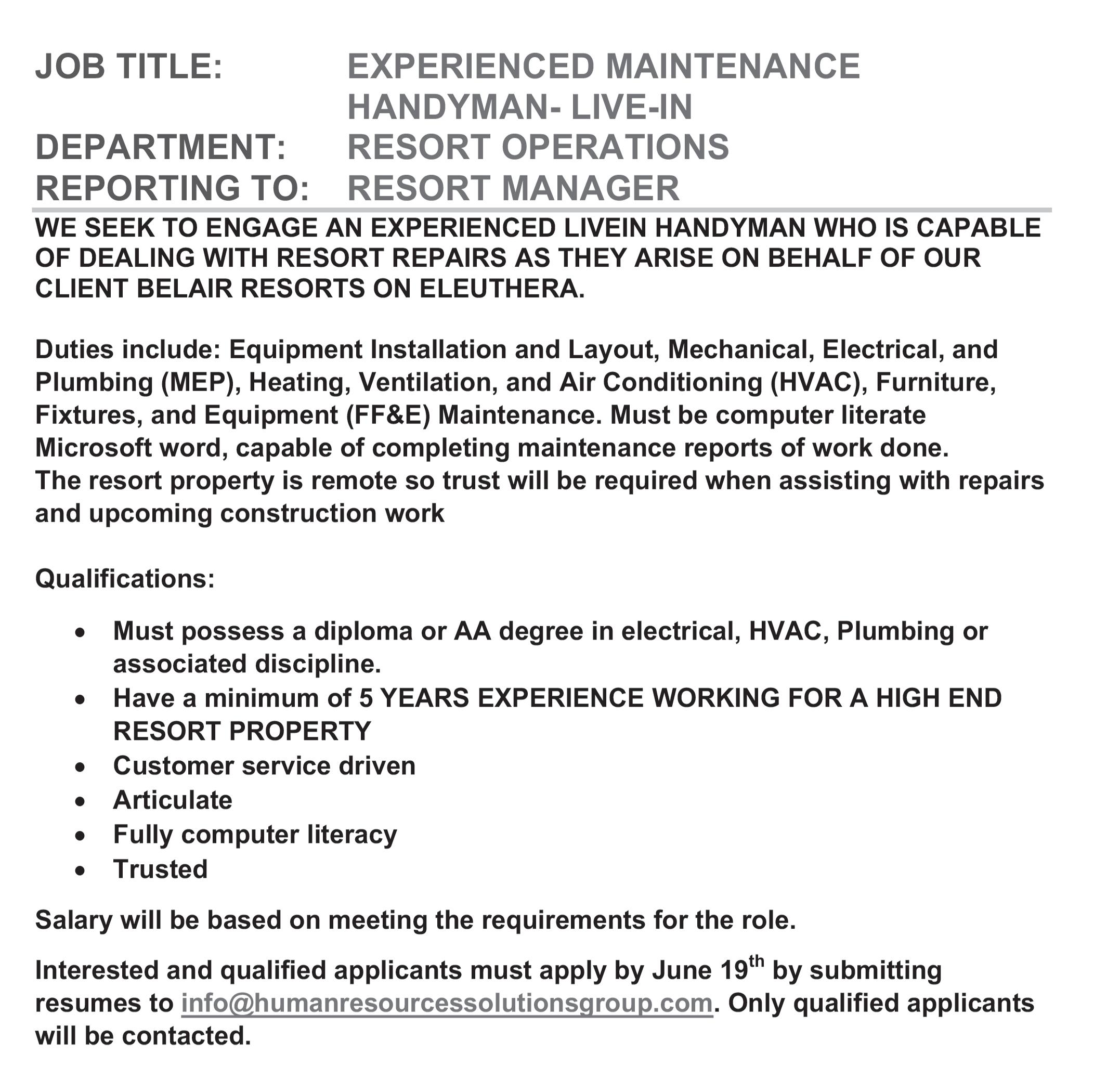
NULLIUS ADDICTUS JURARE IN VERBA MAGISTRI
“Being Bound to Swear to The Dogmas of No Master”
LEON E. H. DUPUCH
Publisher/Editor 1903-1914
SIR ETIENNE DUPUCH, Kt., O.B.E., K.M., K.C.S.G., (Hon.) LL.D., D.Litt .
Publisher/Editor 1919-1972
Contributing Editor 1972-1991
RT HON EILEEN DUPUCH CARRON, C.M.G., M.S., B.A., LL.B.
Publisher/Editor 1972-
Published daily Monday to Friday
Shirley & Deveaux Streets, Nassau, Bahamas N3207
TELEPHONES
News & General Information
(242) 502-2350
Advertising Manager (242) 502-2394
Circulation Department (242) 502-2386
Nassau fax (242) 328-2398
Freeport, Grand Bahama (242)-352-6608
Freeport fax (242) 352-9348
WEBSITE, TWITTER & FACEBOOK
www.tribune242.com

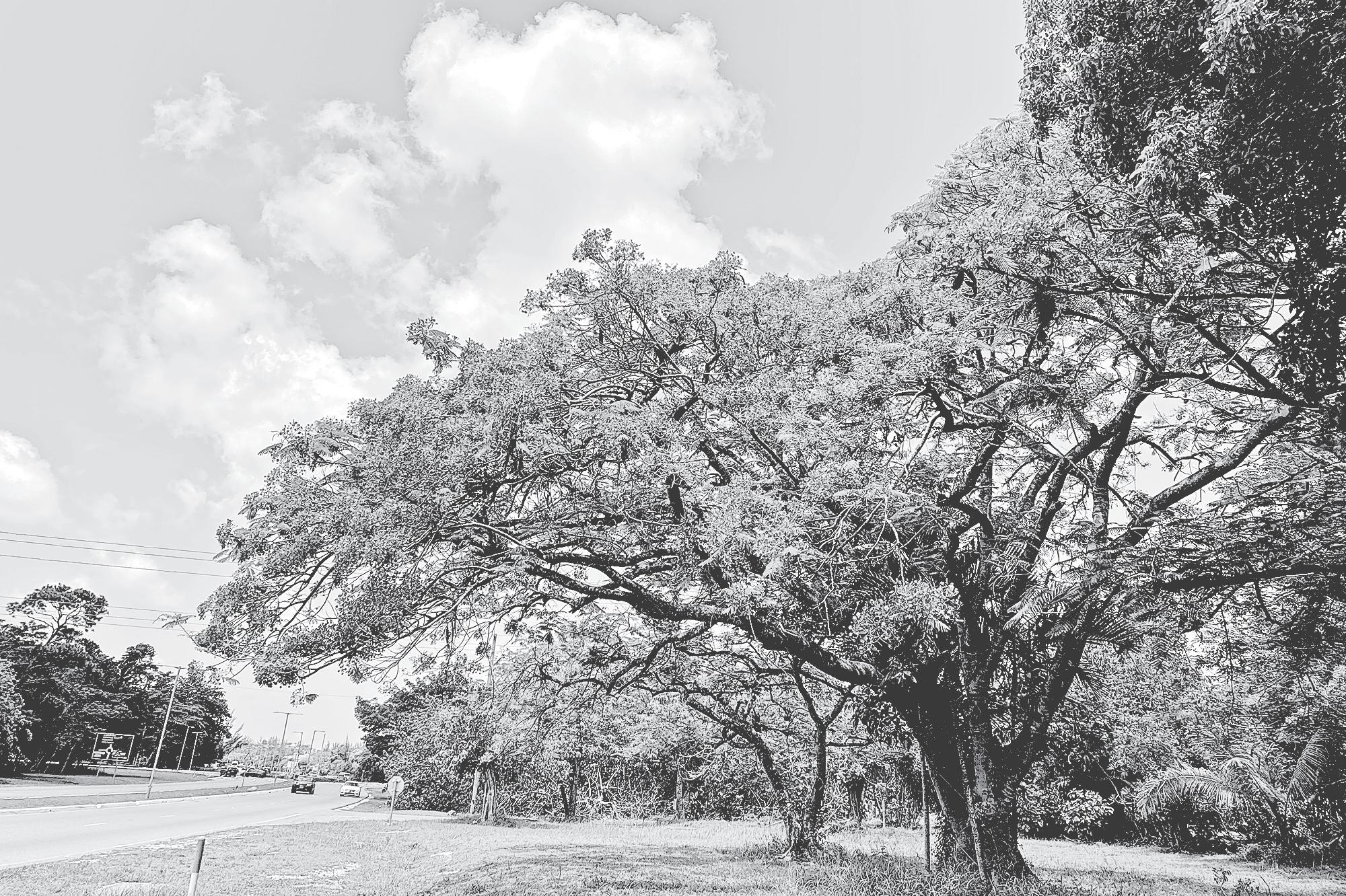


@tribune242 tribune news network
ISRAEL’S conflict with Iran represents far more than another Middle Eastern crisis – it marks the emergence of a dangerous new chapter in nuclear rivalries that has the potential to reshape global proliferation risks for decades to come.
What began with Israeli strikes on Iranian nuclear facilities and other targets on June 13, 2025 has now spiralled into the world’s first full-scale example of what I as an expert in nuclear security call a “threshold war” – a new and terrifying form of conflict where a nuclear weapons power seeks to use force to prevent an enemy on the verge of nuclearisation from making that jump. As missiles continue to rain down on both Tehran and Tel Aviv – with hundreds dead in Iran and at least 24 killed in Israel – the international community is witnessing the collapse of traditional deterrence frameworks in real time.
Unlike traditional nuclear rivalries where both sides possess declared arsenals – like India and Pakistan, who despite their tensions operate under mutual deterrence – this new threshold dynamic creates an inherently unstable escalation spiral. Iran increasingly believes it cannot deter Israeli aggression without nuclear weapons, yet every step toward acquiring them invites more aggressive Israeli strikes. Israel, for its part, cannot permanently eliminate Iran’s nuclear knowledge through military means – it can only delay it through means that would seemingly guarantee future Iranian determination to acquire the ultimate deterrent.
Under this dynamic, neither side can step back without accepting an intolerable outcome: for Israel, an Iran more determined than even in becoming a nuclear weapons nation capable of deterring Israeli action and ending its regional military dominance; for Iran, the risk of regime change through devastating Israeli strikes. The consequences of this deadly logic extend far beyond the Middle East.
The stakes could not be higher, as Iranian officials have called the attack “a declaration of war” and vowed that destroyed nuclear facilities “would be rebuilt.” Israel, meanwhile has warned its campaign will continue “for as many days as it takes.”
Most ominously, the scheduled nuclear talks between the US and Iran were called off, with Tehran dismissing any such dialogue as “meaningless.” This may suggest diplomacy’s window – which opened for just a few months under Trump’s second administration, after being closed during his first – was deliberately slammed shut.
More broadly, the Israeli strikes mark a dangerous evolution in international norms around preventive warfare. While Israeli officials called this a “preemptive strike,” the legal and strategic reality is different. Preemptive strikes respond to imminent threats – like Israel’s 1967 Six-Day War against Arab armies preparing to attack. Preventive strikes, by contrast, target distant future threats when conditions seem favourable –like Japan’s attack on Pearl Harbour in 1941.
Israel justified its action by claiming Iran could rapidly assemble up to 15 nuclear bombs. Yet, as the International Atomic Energy Agency director, Rafael Grossi, warned beforehand, an Israeli strike could solidify rather than deter Iran’s nuclear ambitions, potentially prompting withdrawal from the Nuclear Non-Proliferation Treaty. True to that warning, on June 16, Iran announced it was preparing a parliamentary bill that would see the country leave the 1968 treaty.
Israel’s calculations in opting to strike build on the same erosion of international legal frameworks that has legitimized preemptive warfare since the United States’ military action in Afghanistan and Iraq after the Sept. 11, 2001 attack. America’s “war on terror” fundamentally challenged sovereignty norms through practices like drone strikes and preemptive attacks. More recently, operations in Gaza and
elsewhere have demonstrated that violations of international humanitarian law carry limited consequences in practice. For Israel, this permissive environment has seemingly created both opportunity and justification regarding striking Iran – something that Prime Minister Benjamin Netanyahu has been pursuing for decades.
Already, Russia’s attacks on Ukraine’s Zaporizhzhia nuclear plant demonstrated nuclear facilities’ vulnerability in modern warfare. I believe Israel’s actions further risk normalizing attacks on nuclear infrastructure, potentially legitimizing similar preventive actions by India, China or the US against emerging nuclear programs elsewhere.
Israel’s initial strike quickly triggered inevitable escalation. Iran’s retaliation came in waves: first hundreds of drones and missiles on June 13, then sustained barrages throughout the following days. By the morning of June 15, both countries were trading strikes on energy infrastructure, military bases and civilian areas, with no immediate end in sight.
The Houthis in Yemen have since joined the fight, by launching ballistic missiles at Tel Aviv. Notably absent are Hezbollah, Hamas and Iran’s Iraqi militias – all significantly damaged by recent action by Israel. This degradation of Iran’s “axis of resistance” – its traditional forward deterrent – fundamentally alters Tehran’s strategic calculations. Without strong proxies to threaten retaliation, Iran is more exposed to Israeli strikes, making nuclear weapons seem like the only reliable deterrent against future attacks.
The escalation pattern illustrates what can happen when a government casts aggression as prevention. Having initiated the recent escalation of hostilities, Israel now faces the consequences. Iranian President Masoud Pezeshkian’s vow that destroyed facilities “would be rebuilt” underscores that Israeli action designed to prevent nuclearisation may instead result in Iran pursuing it with renewed determination.
This creates what strategists call the “commitment trap” – a dynamic where both sides face escalating costs but cannot back down. Israel faces its own strategic dilemma. The strikes may ultimately accelerate rather than prevent Iranian nuclearisation, yet backing down would mean accepting a nuclear Iran. Netanyahu’s promise that current strikes are “nothing compared to what they will feel in coming days” shows how quickly strikes sold as preventative escalate toward total war.
Unlike established nuclear powers that can negotiate from positions of strength, threshold states, such as Iran, face a stark choice: remain vulnerable to preventive strikes and regime change or race toward the protection that nuclear deterrence provides.
North Korea offers the clearest example of this dynamic. Despite decades of sanctions and military threats, Pyongyang’s nuclear program has made it essentially immune to preventive strikes. Iranian leaders understand this lesson well – the question is whether they can reach the same protected status before suffering decisive preventive action.
Traditional nuclear deterrence theory assumes rational actors operating under mutual vulnerability. But threshold wars break these assumptions in fundamental ways. Iran cannot fully deter Israeli action because it lacks confirmed weapons, while Israel cannot rely on deterrence to prevent Iranian weaponisation because Iran’s nuclear program continues advancing.
This creates “use it or lose it” dynamics: Israel faces shrinking windows to act preventively as Iran approaches weaponisation; Iran faces incentives to accelerate its program before suffering additional strikes.
Farah N Jan
University of Pennsylvania
EDITOR, The Tribune. EVERY person dreams of one day having a place to call their own. A home with a front door that opens to peace. A home where a child can sleep safely, where a grandmother can sit quietly in the evening breeze, and where a family can build memories for generations. But for too many in New Providence, that dream has become a cruel illusion.
In our Over-TheHill communities like Englerston, Bain and Grants Town, St Barnabas, and Centreville, the reality is far from peaceful. The truth is, most residents in these areas simply cannot afford to rent a decent place to live, much less buy one. The cost of land alone makes ownership nearly impossible for the average working Bahamian. With land prices in New Providence skyrocketing over twenty thousand, even before a foundation is poured or a roof nailed down, the thought of homeownership is more fantasy than future.
And so, what happens? Families crowd together in small houses or apartments. In many cases, three or four generations are packed under one roof. That means six to twelve people sharing a space that was designed for maybe half that number. Grandparents, parents, children, grandchildren all sleeping in shifts, eating in corners, and trying to survive. There is no room to breathe. There is no space to grow. And in many cases, the homes themselves are falling apart with plumbing barely functioning, electrical wires exposed, and no safe green space for children to play. This is not how people are supposed to live.
But we can change this. We must.
This is not about pushing people out. This is not gentrification. This is about lifting people up. This is urban revitalisation. This is about reimagining what life in our inner-city communities can be and building a future where Bahamians are not renters for life but owners of the keys to their own destinies.
In Florida, a bold project recently broke ground that should serve as a beacon for us. A Miami- based developer, in partnership with a nonprofit founded by former NBA player Alonzo Mourning, built a modern, affordable housing complex called Astoria on 9th. This wasn’t a row of rundown buildings with poor maintenance and little dignity. It was a 120-unit development thoughtfully designed for real people with real needs. The complex included community gathering spaces, green areas, secure access, and most importantly, rent and ownership options that
matched the actual income levels of the residents. It gave families a fresh start without displacing them. It gave seniors a safe place to rest. It gave dignity back to communities that had been ignored for far too long. We can do the same thing here. And we must do it now. The average income in areas like Englerston and Bain Town is not enough to buy a traditional home. Most households bring in somewhere between two thousand and thirty-five hundred dollars a month. That doesn’t stretch far when rent alone eats up nearly half of that. Then there’s electricity, water, groceries, school fees, bus fare, and everything else.
Homeownership? Forget it. Many residents are stuck paying rent on buildings that should have been condemned years ago, just to keep a roof over their children’s heads. This is why we need to build differently. We need to think differently. Instead of large, expensive lots that only the wealthy and upper middle class can afford, we must build modern mid-rise condos and apartments in the heart of these communities. Units that are safe, secure, and above all, affordable. Homes with working plumbing, proper electricity, natural light, and shared outdoor spaces where children can run freely and parents can sit on a bench and breathe. This is about building neighbourhoods, not just buildings.
Let’s talk about access. Our inner-city communities are already close to schools, clinics, food stores, and public transportation. Why not design affordable housing that makes these amenities even more accessible? Let’s build walkable streets, plant shade trees, install street lighting, and provide safe sidewalks so that single mothers can walk their children to school or catch a jitney without fear. Let’s design city living for Bahamians, not just for tourists and investors. We cannot continue to pretend that not having a realistic affordable option for families lower income house is acceptable. We cannot close our eyes to these large families living in overcrowded dwellings, with broken pipes, some without electricity, with damp rooms where dreams are suffocating. The time has come to redefine what life in the Over-The-Hill Communities in New Providence looks like. It is time to give our people more than promises. It is time
to give them options they all can acquire even with a $250 a week salary.
Urban revitalizsation does not mean erasing culture. It means preserving it with pride and care. Englerston, St Barnabas, Bain and Grants Town, and Centreville are the heartbeat of our country’s history. Their streets tell the story of our nation’s struggles and triumphs. But if we love these communities, we must be willing to fight for their future. Not with speeches, but with cement, with action, and with vision. We already have the blueprint. We just need the will. A public-private partnership, where the government helps subsidise land and infrastructure, while developers build cost-effective, modern homes, is not only possible it is necessary. Include local nonprofits who understand the community. Let them help guide the design and distribution. Let the people who live there be a part of what rises up.
Start with one pilot community. Invest in a hundred units. Price them according to what a Bahamian single mother earning twenty-five hundred dollars a month can afford. Offer rent- to-own options. Offer first-time homeowner training. Let’s give people a path to not just live, but to thrive.
Because here’s the truth: families with hope, with stability, with ownership, build stronger communities. They take care of their surroundings. They plant gardens. They support their neighbours. Crime goes down. School attendance goes up. Pride comes back. This is not just about buildings. This is about restoring dignity. It is about giving children a home they can grow up in, and maybe one day pass on to their children.
Let’s stop making excuses about what we can’t afford. The real question is what can we no longer afford to ignore?
We are losing too many families to hopelessness. Too many communities to decay. We are losing the soul of our city. But we can bring it back. Not by tearing it down, but by building it up. It is time to put our money and our energy where our mouths are. Let’s invest in Over-The- Hill. Let’s show Englerston, Bain Town, St Barnabas, and Centreville that they matter. Let’s lead the way in making Nassau a capital that works for everyone. Urban revitalisation is the right direction. It is the compassionate direction and it is the future we must build together.
HEATHER W MCDONALD June 15, 2025.
By LYNAIRE MUNNINGS Tribune Staff Reporter lmunnings@tribunemedia.net
THE Privy Council has dismissed an appeal by Raymond Meadows in a property dispute involving a strip of land in Freeport, Grand Bahama, ruling that his neighbours, Keith Rolle and Dorothea Rolle, legally acquired the land through adverse possession.
The dispute began after Mr Meadows purchased land in 2017 and discovered a paved roadway and fence — built by the Rolles in 2005 — encroaching on his property. He sued for trespass, but the Rolles argued they had been in continuous possession of the land for over 12 years, making them lawful owners under the Limitation Act 1995.
The trial judge had ruled
in favour of Mr Meadows, but the Court of Appeal reversed that decision, finding that time under the Limitation Act only stops when legal action is filed, not when ownership is verbally asserted.
The Privy Council agreed, noting that the Rolles were in possession from at least March 18, 2005 and that Mr Meadows did not initiate court proceedings until July
By JADE RUSSELL Tribune Staff Reporter jrussell@tribunemedia.net
THE Bahamas National Unmanned Systems (BAHNUS) Academy held a graduation ceremony on Friday at the Royal Bahamas Defence Force’s Coral Harbour Base, marking the completion of its first training cycle in drone operations.
Seventeen participants and four instructors graduated from the academy’s seven-week programme, which provided operational and theoretical training in drone technology. The graduates included personnel from the Royal Bahamas Police Force, the Customs Department, the Department of Correctional Services, the Department of
Immigration, and the Royal Bahamas Defence Force (RBDF).
Captain Carlon Bethell, deputy director of the RBDF and director of the BAHNUS Academy, said the training focused on the use of unmanned aerial and underwater systems for surveillance and reconnaissance. He said drones could be used to gather intelligence at sea, including information about vessels operating within Bahamian waters. He cited the Accipiter drone currently in use by the RBDF — a gas-powered system capable of flying for 14 hours — as an example of how such technology could support surveillance in remote areas. When asked about the role of the academy,
Captain Bethell said it is part of a strategy to equip national security agencies with additional tools for monitoring, search and rescue, and data gathering.
Minister of National Security Wayne Munroe attended the ceremony and congratulated the graduates.
The BAHNUS Academy was initially launched in October 2024 aboard HMBS Coral Harbour.
According to the RBDF, the academy’s training is designed to support multi-agency efforts in law enforcement and environmental monitoring.
RBDF officials say the programme reflects an effort to incorporate more technology into national security operations and to foster regional cooperation in drone-related fields.

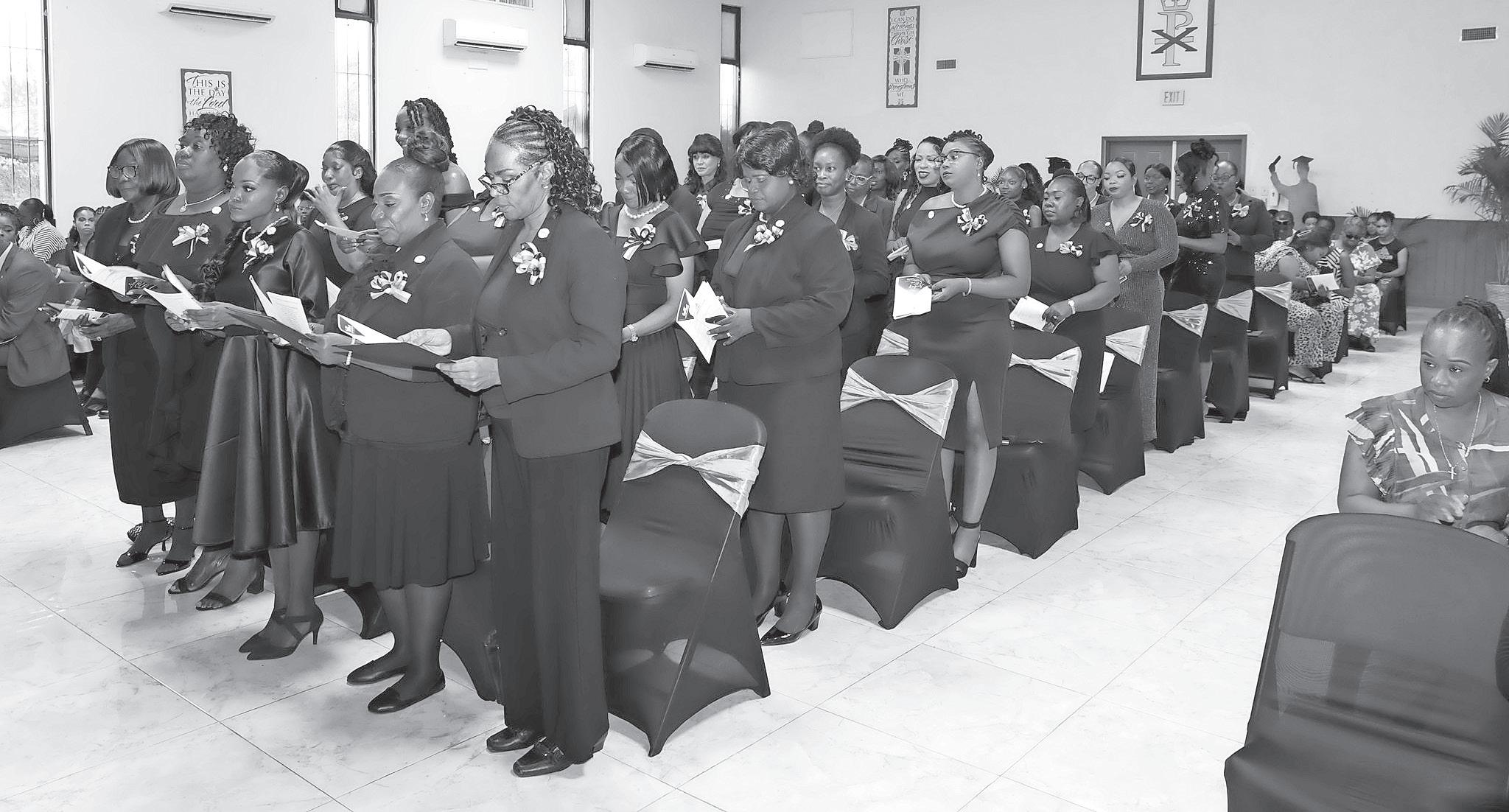


3, 2017, more than 12 years later. It confirmed that “the Appellants would have been in possession for more than 12 years when the Writ was issued”.
Mr Meadows also argued that land within the Port Area, governed by the Hawksbill Creek Acts and GBPA regulations, was exempt from adverse possession claims. The council rejected this, stating there is
nothing in the legislation or regulations that overrides the Limitation Act.
He further claimed that restrictive covenants in the property deeds prevented adverse possession. The Privy Council dismissed this too, stating the covenants did not disapply the Limitation Act or waive any landowner’s legal rights.
The board rejected the notion that a court-issued
certificate under the Quieting Titles Act was required before claiming adverse possession, clarifying that title vests automatically under the Limitation Act after 12 years of undisturbed occupation.
Concluding that none of Mr Meadows’ arguments had merit, the Privy Council dismissed the appeal without requiring a response from the Rolles’ legal team.
By PAVEL BAILEY Tribune Staff Reporter pbailey@tribunemedia.net
AN American tourist was fined over $5,000 yesterday after admitting to groping a woman and exposing himself during a cruise last weekend.
Corey Smith, 46, was arraigned before Assistant Chief Magistrate Carolyn
Vogt-Evans on charges of indecent assault and indecent exposure. While aboard the Carnival Freedom on June 13, Smith slapped a 21-yearold woman’s buttocks and groped her private parts. He later exposed himself to the same woman in a public area of the ship and began masturbating in front of her.
The magistrate ordered him to pay a $5,000 fine for the indecent assault or face eight months in prison. He was also fined $100 for the indecent exposure charge, with a default sentence of one month in prison.
Inspector S Coakley served as the prosecutor in the case.
Smith pleaded guilty to both charges and expressed remorse for his actions.
By PAVEL BAILEY Tribune Staff Reporter pbailey@tribunemedia.net
A 17-YEAR-OLD girl was granted bail yesterday after she was accused of using a car to assault someone on Karl Road last week.
The female defendant, whose name is being withheld, was charged with assault with a dangerous instrument before Senior Magistrate Algernon Allen Jr. She and co-accused Stephen Pennerman Jr were also charged with an additional count of assault with a dangerous instrument and causing harm.
The pair reportedly assaulted Jermaine Porter with a black Toyota Passo on June 8. They are also accused of striking him with a piece of wood and injuring him during the same incident. While the juvenile admitted to using her car to assault Porter, both defendants pleaded not guilty to the remaining charges.
Pennerman was granted $4,000 bail with one or two sureties, while the juvenile was granted $5,000 bail. Their trial is set to begin on August 7. Sergeant 3004 Forbes served as the prosecutor.
Meanwhile, Jermaine Porter, 34, was charged with causing harm before Senior Magistrate Anishka Isaacs. He is accused of injuring Stephen Pennerman Jr during the June 8 incident. Porter pleaded not guilty. His bail was set at $3,500 with one or two sureties. As a condition of his release, he must sign in at the East Street South Police Station every Monday by 7pm. He was also warned not to interfere with the complainant or any witnesses. Porter’s trial is scheduled to begin on October 1. Sergeant 3506 Nesbitt served as the prosecutor.
By PAVEL BAILEY Tribune Staff Reporter pbailey@tribunemedia.net
TWO men accused of stealing $32,000 from a man on West Bay Street were denied bail yesterday. Joe-lando McKay, 28, and Patrick Anderson, 61, appeared before Senior
Magistrate Anishka Isaacs charged with stealing and receiving.
Prosecutors allege that the pair stole the money from Barrett Miller on June 12. Both men pleaded not guilty.
Sergeant 3506 Nesbitt, serving as the prosecutor, objected to bail for the defendants.
Magistrate Isaacs denied their bail application and ordered that they be remanded to the Bahamas Department of Correctional Services until their trial on August 20.
The men are represented by attorney Murrio Ducille.

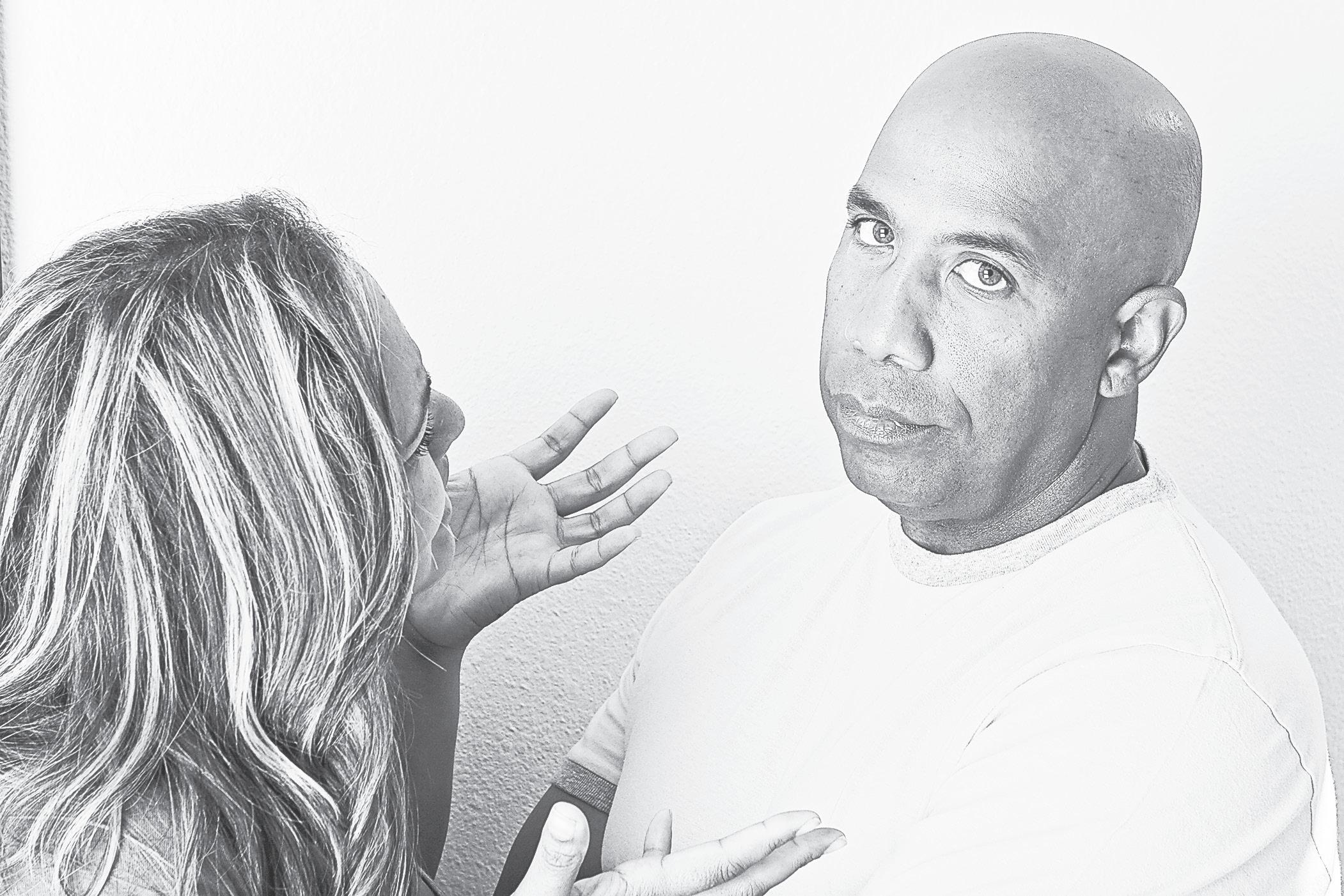
THE BIBLE, a significant source of wisdom for many, guides us in understanding the impact of contentious behaviour. It states, “It is better to dwell in the corner of the housetop than to share a house with a contentious woman.” This verse can be interpreted to apply to any relationship, regardless of gender or role. The most destructive form of communication is nagging, a constant annoyance that can be felt in every drip, like rain on a rainy day. The Bible’s depiction of a contentious woman in a shared house is a powerful metaphor for the destructive effects of nagging.
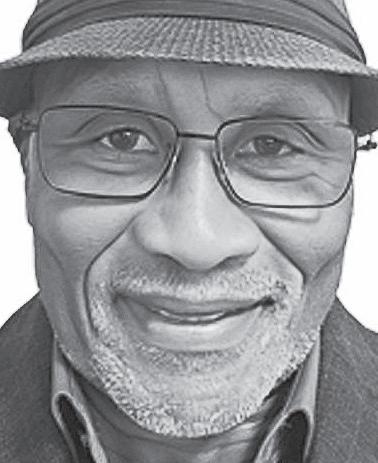
BY IVOI NE INGRAHAM
The Bible uses the concept of “nagging” describe
the negative impact of persistent and disruptive behaviour, often within the context of relationships. Specifically, Proverbs 27:15-16 vividly compares a nagging partner to a constant dripping on a rainy day, highlighting such behaviour’s relentless and annoying nature. The verse emphasises that it is difficult to restrain or change such behaviour, compared to trying to stop the wind or grasp oil with one’s hands.
Nagging is a universal source of annoyance, not limited to any particular relationship. Whether it’s a child reminding their parent about rules, a parent barking instructions to a child, a boss pressuring employees

‘Facing reality, we conclude that immaturity is the mother of nagging. When communication has broken down, nothing else can be salvaged or built.’
to meet deadlines, or spouses repeatedly bringing up past mistakes, nagging is a common experience. However, constantly revisiting and regurgitating the same complaints and concerns of the past is a severe mental weakness that addressed with professional help and/or treatment.
Nagging becomes second nature, a negative behaviour the Bible tells us to avoid. It can come from either a male or female partner. It doesn’t matter whether it’s education, position, disposition, colour, country, or gender; all have traits.
People who like to control think they can say what they like and get the listener to do what they want, which pleases the nagging person, but if there is no response, that would be a sign of being ignored. Unfortunately, not answering a nagging person would only compound the problem.
Nagging could come from a place of insecurity or an inferiority complex. which causes the nagger to raise their game.
People who can’t see the damage done are dangerous because constantly gnawing at a person’s head and repeating the same thing daily is a recipe for possible retaliation. While there can be no justification for a negative response, the reaction could be harmful, extreme, or even catastrophic. Of course, the mature thing to do is to walk away and find a safe space where you can engage in some positive talk or receive encouraging words.
It’s important to note that domestic violence is not solely measured by physicality. Emotional abuse, such as persistent nagging, can also be a form of domestic violence. This description is not genderbased, and it’s not an exact science, but it’s crucial to recognise the potential harm of such behaviours.
Constantly talking over someone’s head is not a good idea. It is best to speak positively to each other and leave the area when that is not possible so that cooler heads can prevail. Positive communication brings a sense of relief and hope that things can get better. It’s a beacon of light in the darkness of nagging, offering a path to resolution and understanding. There are enough examples of what happens when tolerance is absent and the immediate response is physical, but positive communication can change that narrative.
It’s a powerful tool that can transform your relationships for the better.
Imagine this: Every day, a person goes home and is greeted with the same nagging, sometimes repeating the exact words and not relenting even if there has been no response. Can you imagine what would happen if one of the people had a short fuse? The usual response is that physicality is the shortcut to discouraging the noise. There are enough examples of extreme stress caused by nagging and too many examples of people walking away to avoid enduring the torture of nagging. Being constantly told negative things about yourself is unfortunate because it leaves no room for a positive compromise, which involves finding mutually beneficial solutions through respectful and constructive communication. It’s a powerful tool that can inspire and motivate you to find more effective ways to communicate, empowering you to take control of your relationships and your life. The best relationships are often destroyed because one cannot refrain from speaking for
a minute. Many good relationships and marriages have ended prematurely because of the resistance to manipulating your mate through nagging. There have been numerous physical hardships, as many could no longer endure them. There can be no excuse for tormenting your partner. No explanation is acceptable because discipline is the order of the day. The jury is out, but there must be a direct connection between persistent emotional abuse like nagging and mental health issues, which, in extreme cases, could lead to suicidal thoughts or actions.
Self-respect is a powerful tool in the fight against nagging. It’s not just a luxury; it’s a necessity. Upholding your self-respect can be a game-changer in your relationships, empowering you to demand better for yourself and protect your mental and emotional well-being. Remember, no one deserves to be nagged.
Facing reality, we conclude that immaturity is the mother of nagging. When communication has broken down, nothing else can be salvaged or built. Be wise; listen more than you talk. There is no rule that you have to answer everything all the time. Sometimes, keeping quiet may save your relationship or even your life. We have foolish pride that can cause us to swim in deep waters, too deep to survive in. Putting fingers to your lips could be an asset; when you talk, you give away what you’re thinking, but when you keep quiet, no one knows what you’re thinking.
There is a song by Joe Jones called “You talk too much.”
You talk too much; you worry me to death You talk too much; you even worry my pet, you talk too much.
You talk about people that you don’t know You talk about people wherever you go; you talk too much.
WITH the crisis in the Middle East moving so fast following Israel’s first long-anticipated strike on Iran last week, it is hard to comment meaningfully at this early stage. Observers are still assessing the significance of this and subsequent attacks and the retaliation by Iran. However, it is such a serious issue that I should like to offer a few thoughts in today’s column.
There has been so much international media coverage of these developments over the last few days that everyone will surely be aware that Israel has launched the strikes to damage or eliminate Iran’s nuclear programme and, at the same time, to try to secure regime change. Thus, it is clear that the Israeli bombing has been primarily directed against nuclear and military infrastructure, with key scientists in the country’s nuclear programme and military commanders being targeted specifically.
This is now being termed a “pivot point of volatility” in the Middle East, with Iran calling the initial Israeli strikes an act of war. But, as prime minister Benjamin Netanyahu has said repeatedly, his country will be in serious jeopardy if Iran develops a nuclear weapon.
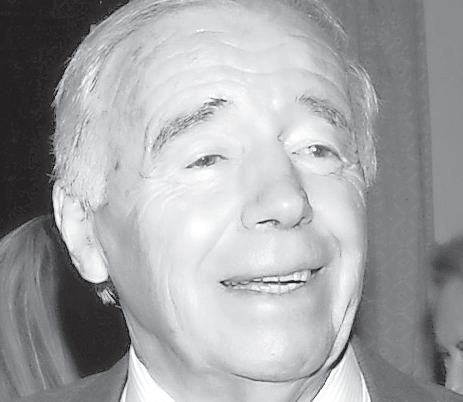
Fears are growing of a wider conflict that could spiral out of control, precipitate a new conflagration in the whole region - which clearly other Arab states do not want -- and even engulf the rest of the world. Furthermore, Iran has threatened action against US, UK and French bases in the region if those countries support Israel. For its part, the US has already warned Iran firmly of the consequences of any attacks on American targets in the area, and the UK has sent RAF military jets to the region.

After the first attacks, Netanyahu stated that his country refuses to be the victim of a nuclear holocaust as Iran is reported by the International Atomic Energy Agency to be failing to comply with its nuclear non-proliferation obligations. According to reports, this means that it is enriching uranium at sufficient levels to enable it to produce nuclear weapons in the near future. Israel aims to undermine or destroy that capability and to force Iran to end its nuclear programme; or, if that proves impossible, at least to slow down the process substantially while negotiations continue.
The Netanyahu government has been warning for years about Iran’s hostile activities in the Middle East
and, in particular, the development of its capability to produce nuclear weapons. The Israeli prime minister calls it an existential threat to destroy Israel – nothing less, in Netanyahu’s words, than the complete destruction of his country. It is therefore fighting for its very existence. The Israelis have been talking for a long time about bombing Iran. But it seems that most recently the US has been urging against any preemptive direct Israeli
AMIDST so much uncertainty in today’s unstable world, it is good to able to write about a recent success in international diplomacy and relations.
After a lengthy period of talks about the rules governing the border between Spain and the British Overseas Territory of Gibraltar since the UK left the European Union in 2020, a deal was agreed recently about its status post-Brexit in respect of the movement of people. This is, effectively, a political agreement that will protect British sovereignty and military autonomy and secure Gibraltar’s economic future. The agreement resolves the last major issue from Brexit. It removes the need for checks on people and goods crossing the Gibraltar-Spain border, thereby avoiding such onerous checks and delays for the estimated 15,000 people who daily cross the land border between Gibraltar and Spain for work and leisure. This provides certainty for people and businesses in Gibraltar.
In order to make this operate properly, provision has been made for travellers arriving at Gibraltar airport to face passport checks by Gibraltar and Spanish officials, since under the new arrangements those arriving would be able to carry on their travel into Spain and the EU free-travel area without further checks. This is similar to the arrangements at St Pancras station in London where passengers travelling to France go through French immigration and passport control.
According to reports, all the parties concerned – Britain, Spain, the EU and the Gibraltarians themselves - are content with the outcome. Most importantly for Gibraltar, its existing sovereignty is unchanged so that it is still classified as a British Overseas Territory. As such, it has its own parliament and is self-governing in all areas except defence and foreign policy.
Significantly, the Spanish prime minister is quoted as saying in a telephone call with his British counterpart that the deal “unlocks opportunities” to strengthen UK-Spain relations. What is more, In welcoming the agreement, the Chief Minister of Gibraltar has said that it is “what Gibraltar wants and needs – one that will protect future generations of British Gibraltarians and does not in any way affect our British sovereignty”.
Gibraltar is a tiny territory, some three miles long and slightly less than

a mile wide. Its population is about 32,000. Situated at the bottom tip of the Iberian peninsula, it is connected to the southern part of Spain by a low sandy isthmus that is one mile long. Historically, after being captured and occupied by Britain in 1704 during the Spanish War of Succession, Gibraltar was formally ceded to Britain in perpetuity under the Treaty of Utrecht in 1713 which ended that war. Since then, Britain has exercised sovereignty over it, though Spain has continued to dispute this over the years based on arguments about the extent of the territory ceded. It continues to assert its claim to the territory and, according to reports, still does not recognise Britain’s sovereignty. Over the years, Spain has attempted to regain control over Gibraltar through military sieges and it closed the border temporarily in 1969. But, since the 18th century, with its famous massive Rock of Gibraltar standing guard majestically over this small piece of land at the entrance to the Mediterranean Sea from the Atlantic Ocean, the territory became a symbol of British naval strength. Its strategic importance grew with the opening of the Suez Canal in 1869 as it developed into an essential provisioning port, a naval dockyard and military garrison.
Thus, Gibraltar has deep historical roots as a British territory. Its people have consistently shown
that they wish to retain that status. In the most recent referendum on the issue in 2002, the record shows that no less than 99 percent of voters rejected a proposal to share sovereignty with Spain, even though the proposal was said to have been ‘broadly agreed’ by both governments.
Inevitably, there are some commentators who argue that the Treaty of Utrecht was such a long time ago that Britain and Spain, as close allies in the modern world, should not necessarily be bound by its terms.
Moreover, with such small numbers of people involved - and given the importance of the relationship between the two countries and their broader interests - it makes sense to hand Gibraltar back to Spain. But others believe that Britain should always stick to the principle of self-determination which is written in to the United Nations Charter. Indeed, one of the purposes of the UN is to encourage respect for the principle of equal rights and the self-determination of peoples.
Gibraltarians were, therefore, pleased to hear Sir Keir Starmer’s recent statement that the Falkland Islands and Gibraltar “are British and they will remain British” – though, deep down, it seems that the almost universal local view is that Gibraltar belongs to its own people and is neither Spain’s to lay claim to nor Britain’s to give away.
attack. US secretary of state Marco Rubio has said, on the record, that Israel acted unilaterally in mounting these latest attacks and there was no US involvement. It is widely assumed, however, that the US was informed in advance, not least because it had earlier withdrawn some personnel from the region for security reasons.
The evidence suggests that Israel will not let up in its attacks on Iran which, reportedly, have inflicted
unprecedented damage on the country’s elite and, it is claimed, impaired or destroyed part of its nuclear facilities. So it is being said that “this is only the start”; particularly if Israel thinks that it can achieve regime change.
Iran will surely also continue to respond with retaliatory strikes on Israel, some of which have already caused death and destruction after successfully penetrating the country’s much-vaunted “iron dome”.
Meanwhile, another dimension of this issue will be discussion of it at the G7 meeting in Canada at the weekend. It is a safe bet that the Israel-Iran conflict, alongside the Ukraine war, will dominate this summit meeting of the world’s seven most advanced economies plus the European Union.
It is being said that at this three-day summit Britain, France, Germany and Italy, in particular, will try to bring pressure on President Trump, who reportedly has publicly praised Israel’s strike on Iran, to persuade it to cease further such action and de-escalate the conflict.
HAVING drawn attention in this column to a number of recent initiatives by the British High Commission to assist The Bahamas in a variety of ways, it was good to learn of yet another example of support for local activities, this time in relation to sport.
Briefly, in the limited space available today, the High Commission has made a large donation of kit and equipment to the Bahamas Rugby Football Union (BRFU) to support youth rugby across the country. This comprises large quantities of shirts, shorts, boots, balls and much more, including fifty shirts from the international teams of England and Wales.
This donation was organized in partnership with a UK Charity, SOS Kit Aid, which supports
“grassroots” rugby worldwide. It is hoped that the provision of new kit and equipment will help to energise and motivate young Bahamians interested in playing the sport. The Bahamas has had an independent rugby union for some 50 years. Matches are played regularly at the Winton rugby ground and in Freeport, and Bahamian teams tour often; for example, a youth team recently returned from playing competitive matches in the Dominican Republic.
Followers of rugby will know that England is a leader in the game both domestically and internationally. Participation at the international level is fiercely contested, though many say that world rugby has been dominated for many years by New Zealand and South Africa. That said, for years
England has possessed a top team internationally and won the Rugby World Cup in 2003. In making this donation, High Commissioner Tom Hartley commented that the UK was “passionate” about supporting the young to get in to sport. For his part, the president of the BRFU, Adam Waterhouse, stated that “this kit will have a significant impact on grassroots rugby in The Bahamas”, and he expressed his organisation’s thanks and appreciation. He said that the donation would contribute to its youth programme in New Providence and Grand Bahama as well as some Family Islands.
What a pleasure it is to be able to write about what is another fine example of co-operation between our two countries.
